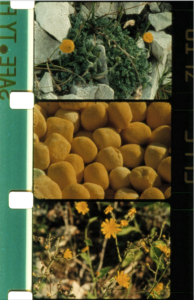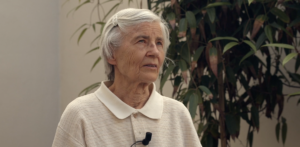21:30 – 23:00

Rose Lowder
Bouquets 1-10, 1994-1995, 16 mm numérisé en HD, couleur, silencieux
1 min. (chaque)
Copyright : Light Cone (Paris) & Rose Lowder
Wednesday 15 July at 9.30pm
In addition to the “La Complicité” exhibition, the Fondation Vincent van Gogh Arles is hosting an evening of screening and discussion around 16mm films by Rose Lowder, experimental filmmaker and co-founder of the Avignon Experimental Film Archives.
>> Free Entry
Rose Lowder will speak here with Vincent Sorrel, teacher-researcher at Grenoble-Alpes University, about some of the films presented in the exhibition, including Les Tournesols (1982-1983) and Voiliers et Coquelicots (2001), but also about other films, such as Fleur de Sel (2010) which explores the cinematographic possibilities of the Guérande salt
Vincent Sorrel, filmmaker and teacher-researcher at the University of Grenoble-Alpes, considers cinematographic practices based on the aesthetic and poetic questions posed by tools to filmmakers. He studied the design of the Bolex camera, used in particular by Rose Lowder, from the manufacturer’s archives as part of research conducted by the University of Lausanne.
Screening:
Les Tournesols (1982-1983), 16 mm, color, silent, 6 min
Bouquets 1-10 (1994-1995), 16 mm, ccolor, silent, 10 min
Voiliers et Coquelicots (2001), 16 mm, color, silent, 2 min
Habitat batracien (2006), 16 mm, color, silent, 8’31 min
Fleur de sel (2010), 16 mm, color, sound, 32 min
Rose Lowder
 Rose Lowder is an experimental filmmaker working in Avignon. She was born in 1941 in Lima and studied fine arts from a young age. She lived in Peru until the late 1950s, taking the opportunity to travel the country extensively at a time when it was still little exposed to international tourism.
Rose Lowder is an experimental filmmaker working in Avignon. She was born in 1941 in Lima and studied fine arts from a young age. She lived in Peru until the late 1950s, taking the opportunity to travel the country extensively at a time when it was still little exposed to international tourism.
After continuing her training in London at the Regent Street Polytechnic and the Chelsea School of Art, between 1964 and 1972 Lowder worked as an editor in the film industry. During her years in London she frequented the independent bookshop Better Books and discovered the work of experimental filmmakers associated with Structural film, such as Malcolm Le Grice and Robert Breer.
Motivated by the desire to build up a collection of films that lay outside the mainstream, and taking her cue from the screening and programming venues created in the early 1970s in the wake of the Anthology Film Archives in New York, Rose Lowder co-founded AFEA (Archives du film expérimental d’Avignon), which today houses nearly two hundred films in 16 mm format as well as paper documents.
Her own practice as an experimental filmmaker flourished as from the late 1970s. Focusing her research on visual perception, which she studied for three years, Rose Lowder constructs her images from the possibilities offered by the film stock and the environment in which she is filming.
Her investigations have led her to work frame by frame with her Bolex camera and to eliminate all post-production editing, as she creates her tapestries of images by passing the film through the camera several times. Lowder gradually developed her own tracking system – a sort of drawn and illustrated score that allows her to identify, while filming, the photograms still available for the creation of new compositions.
Rose Lowder films what she sees, with the goal of transcribing the reality of carefully chosen environments. These are often organic farms and gardens of special interest, which testify to an ecological awareness. Conversely, however, they may be industrialised spaces –notably in Quiproquo (1992), which was shot in Fos-sur-Mer at the mouth of the Rhône. All these places reflect a committed film-making practice situated in a specific locality.
Today the Rose Lowder’s work is distributed by the experimental film distributor Light Cone and has been shown at home and abroad, including most recently in France in group exhibitions at the Villa Vassilieff (2017) and the FRAC Normandie Rouen (2019). Her first series of Bouquets (Bouquets 1–10, 1994–1995), each film one minute long, is now in the collection of the Centre Pompidou.



